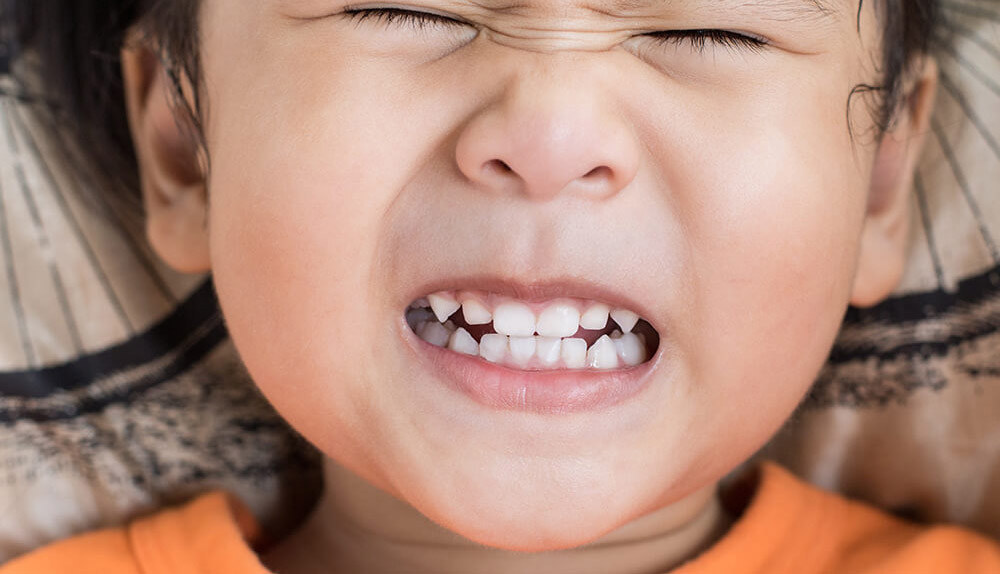
Teeth Grinding in Children: Understanding Bruxism and Solutions
What is Bruxism?
If you notice your child grinding their teeth while sleeping, it’s natural to feel concerned. Teeth grinding in children, known as sleep bruxism, involves involuntary grinding or clenching of teeth as a response to stress or anxiety. Both adults and children can grind their teeth unknowingly during sleep.
While bruxism itself isn’t considered dangerous, continuous teeth grinding or clenching can lead to jaw pain and damage to the teeth over time. Persistent grinding can wear down the enamel, increase tooth sensitivity, and even cause cracks. Understanding the causes and risks of sleep bruxism in children is essential, as well as exploring strategies to prevent and manage this habit.
Types and Prevalence of Bruxism
Bruxism is characterized by repetitive teeth grinding or clenching. There are two types: sleep bruxism and awake bruxism. Awake bruxism usually involves jaw clenching without the grinding sounds. Sleep bruxism occurs during sleep and is often harder to detect. It’s more common in childhood and can start as soon as a baby’s first teeth emerge. More than 80% of children with sleep bruxism are unaware they grind their teeth at night, which can make it challenging for parents to recognize the problem.
It’s important to note that bruxism is quite common among children. If you have a family history of teeth grinding, it’s wise to monitor your child more closely for signs of bruxism.
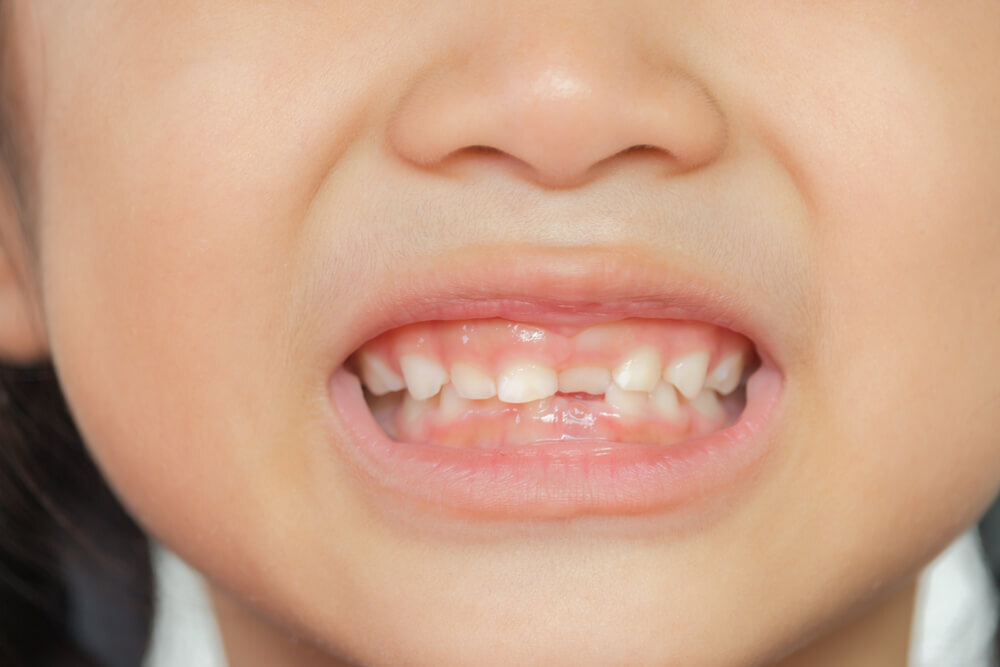
What Are the Harmful Effects of Bruxism?
Bruxism in children can cause several issues, including:
- Tooth Damage: Continuous grinding can wear down enamel, leading to cracks and even tooth fractures, which may result in more serious dental problems.
- Gum Issues: Gum recession and increased jaw pain can occur, leading to heightened tooth sensitivity and discomfort.
- Temporomandibular Joint Disorder (TMJ): Bruxism can contribute to TMJ, a condition causing pain and dysfunction in the jaw joint and muscles controlling jaw movement.
- Eating Difficulties: Jaw pain and tooth sensitivity might make it difficult for your child to chew food properly, potentially leading to eating disorders.
- Mental Health Concerns: Bruxism can be associated with conditions such as depression and anxiety, affecting your child’s overall well-being.
- Decreased Sleep Quality: Bruxism can disrupt your child’s sleep, leaving them tired and irritable during the day, which can impact their school performance and daily activities.
Why Do Children Grind Their Teeth?
Bruxism in children can be caused by a combination of psychological factors, family history, and environmental triggers. Certain medical conditions and sleep disorders can also contribute to bruxism. Stress, anxiety, and other sleep disturbances are often closely linked to teeth grinding in children.
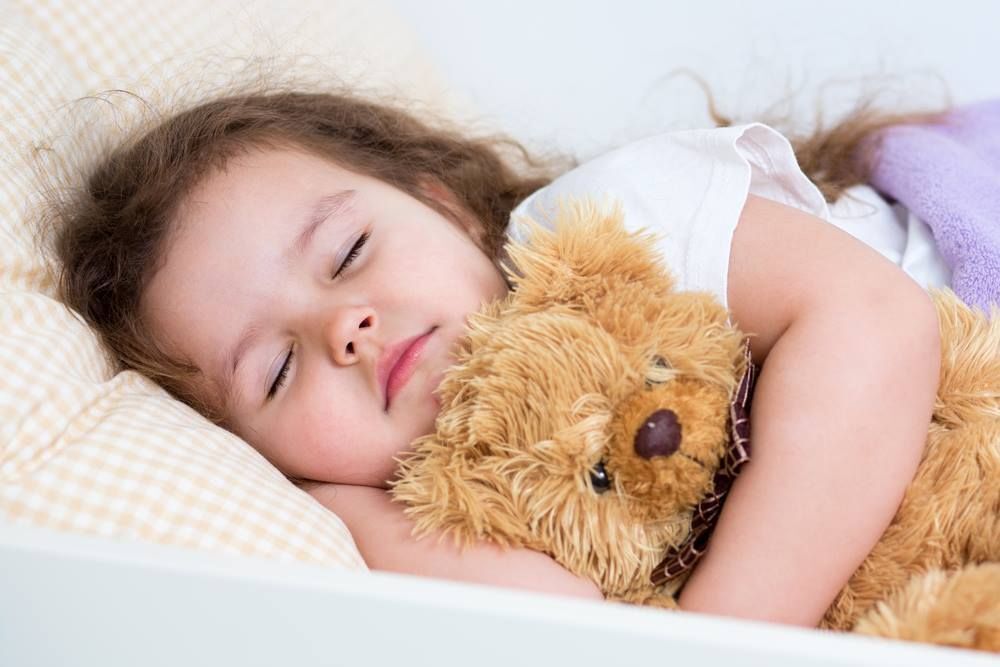
The Impact of Stress
Stress is strongly associated with sleep bruxism, though more research is needed to determine whether stress causes bruxism or vice versa. School-aged children might grind their teeth as a way of coping with stress from homework, chores, or achieving good grades. Emotional changes at home, such as moving or the arrival of a new sibling, can also increase stress levels, leading to teeth grinding. Studies have shown higher levels of stress-related hormones in children with sleep bruxism, suggesting a link between stress and this behavior.
Age and Development
Bruxism is most common among children aged 7 to 10 but can occur at any age. Infants might begin grinding their teeth as soon as their first teeth emerge, especially during teething. For toddlers, stress and separation anxiety can trigger bruxism episodes. In school-aged children, grinding may be a subconscious way of releasing daytime tension during sleep. Adolescents, experiencing hormonal changes, might also see an increase in bruxism symptoms.
Anxiety and Mental Health
Children with high levels of anxiety are more likely to develop sleep bruxism. Separation anxiety, in particular, can lead to teeth grinding. Children who are naturally more anxious or who worry more about school performance might be at greater risk for bruxism. Additionally, children with conditions such as ADHD are also prone to bruxism, as the symptoms of hyperactivity and difficulty focusing can trigger teeth grinding and clenching behaviors.
Dental Problems and Other Contributing Factors
Bruxism is more common in children with misaligned teeth. However, according to the American Academy of Sleep Medicine, there is insufficient evidence to identify dental issues as a direct cause of bruxism. Bruxism is also more prevalent in children who primarily breathe through their mouths. Furthermore, exposure to secondhand smoke is another risk factor for developing bruxism in childhood. Even moderate exposure to secondhand smoke has been linked to an increased risk of bruxism in children.
How Can I Tell If My Child is Grinding Their Teeth at Night?
Some common signs that your child may be grinding their teeth at night include:
- Tooth Damage: Signs of bruxism may include chipped or worn-down teeth and receding gums, which can be observed during regular dental checkups.
- Sensitive Teeth: Children who grind their teeth may become more sensitive to hot or cold foods and drinks.
- Jaw Pain or Headaches: The constant pressure from clenching teeth can lead to jaw pain, headaches, and sometimes an increase in the size of the jaw muscles.
- Grinding Sounds: You might notice grinding sounds at night. To avoid disturbing your child’s sleep, you can use a baby monitor to check for signs of bruxism.
How is Teeth Grinding in Children Diagnosed?
Bruxism can be diagnosed by observing signs such as grinding sounds during sleep, tooth wear, jaw pain upon waking, or frequent headaches. These signs may be detected during a routine dental visit, or if your child complains of morning pain or disrupted sleep. Since sleep bruxism occurs at night, dentists often rely on reports from parents about grinding sounds during their child’s sleep. If the sleep patterns are unclear, a sleep study called polysomnography can be recommended to monitor sleep disturbances and confirm bruxism.
What Are the Treatments for Bruxism?
Bruxism treatment focuses on preventing tooth damage and reducing side effects like jaw pain and headaches. Improving sleep quality and addressing stressors can help make bruxism more manageable.
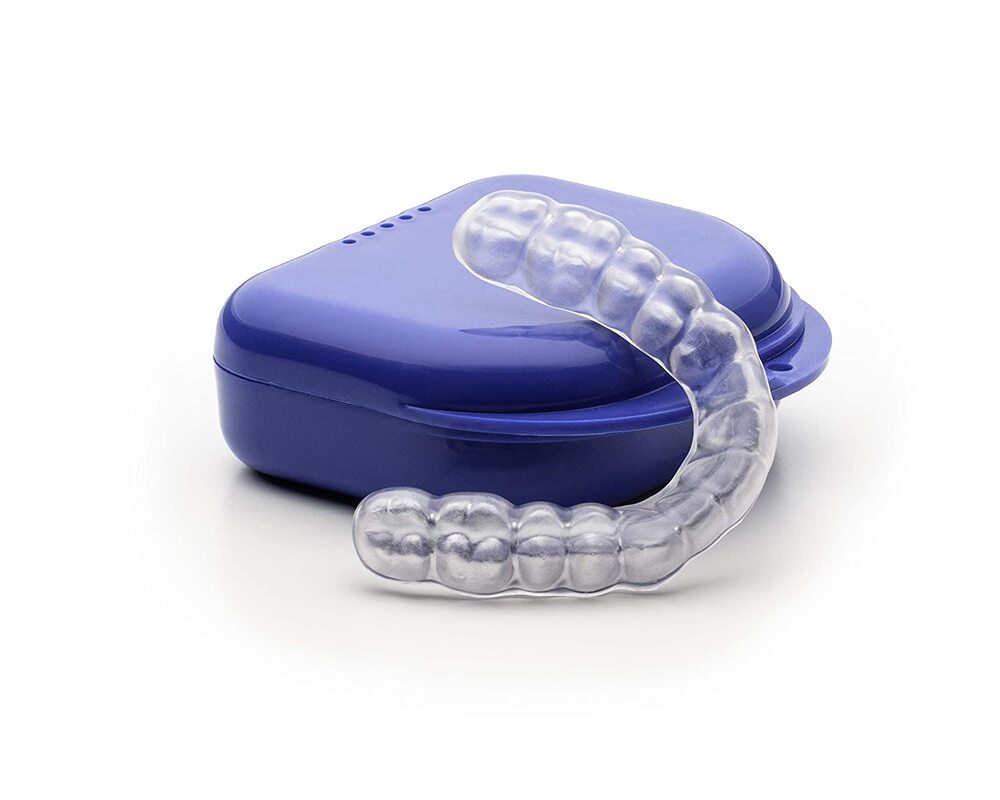
- Night Guard: A dentist can create a custom night guard or splint for your child to wear while sleeping, which protects their teeth from grinding. These guards are tailored to the individual’s needs and can be fitted to the upper or lower teeth. The night guard helps prevent tooth wear caused by grinding and keeps the jaw in the correct position, helping to relax the overworked muscles. While night guards and splints can be effective in managing bruxism, it’s important to note that they don’t cure the condition, and symptoms may return if the guard is not used consistently.
- Orthodontic Treatment: If misaligned teeth are causing the grinding, your dentist may recommend seeing an orthodontist. Orthodontic treatment can help align the teeth properly and reduce bruxism symptoms.
- Stress Reduction and Psychological Support: Managing stress can significantly reduce teeth grinding. Talk to your child about any potential stressors in their life, such as school or social pressures. If needed, seek additional support from a mental health professional or school counselor. Stress management techniques can help your child gain control over bruxism.
- Establishing a Bedtime Routine: Since sleep bruxism is closely related to sleep quality, ensuring your child’s room is dark and quiet, limiting screen time before bed, and providing a low-sugar, nutritious diet can improve sleep. A consistent bedtime routine can promote relaxation and reduce bruxism episodes.
How Can I Prevent or Reduce Bruxism?
Creating a bedtime routine can help prepare a peaceful environment conducive to healthy sleep, making your child feel safe and secure. A routine that includes the following activities can be particularly beneficial:
- A Nutritious Bedtime Snack: Providing a light, nutritious snack before bed can help satisfy your child’s hunger and prepare them for sleep.
- Teeth Brushing: Making teeth brushing a part of their nightly routine not only promotes dental hygiene but also helps your child wind down.
- A Warm Bath: A warm bath before bed can relax your child’s muscles and help them unwind.
- Cuddling: Physical closeness can make your child feel secure and relaxed, easing them into sleep.
- Reading a Story: Reading a bedtime story can calm your child’s mind and prepare them for sleep.
- Soft Music or Lullabies: Playing soft music or singing a lullaby can help your child transition smoothly into sleep.
What Can I Do at Home to Alleviate Bruxism Symptoms?
Teeth grinding or clenching is not inherently dangerous, but it can cause discomfort that affects daily life. There are steps you can take at home to reduce pain and prevent further issues:
- Apply Warm Compresses or Ice to Sore Jaw Muscles: This can relieve tension and reduce pain in the jaw muscles.
- Massage the Muscles in the Neck, Shoulders, and Face: Gentle massage can help relax the muscles and alleviate discomfort.
- Avoid Hard, Chewy Foods: Foods like nuts, bagels, or steak can be tough on the jaw muscles and should be avoided.
- Refrain from Chewing Gum: Chewing gum can overwork the jaw muscles and exacerbate bruxism symptoms.
- Learn Physical Therapy Stretching Exercises: Stretching exercises can strengthen the jaw muscles and reduce pain.
- Relax Facial Muscles Throughout the Day: Regularly relaxing your facial muscles can help manage bruxism symptoms.
- Manage Stress: Reducing stress and practicing relaxation techniques can help alleviate bruxism. Yoga, meditation, and deep breathing exercises can help your child reduce stress levels.
If these home care steps don’t work after a few weeks and your child continues to experience symptoms, it’s important to consult with a dentist. If left untreated, bruxism can have a negative impact on your child’s dental health.
Are There Medications for Teeth Grinding in Children?
There is some evidence that homeopathic remedies or medications may help reduce sleep bruxism in children, but more research is needed to assess their effectiveness and potential side effects. Even if a product is marketed as natural or available over the counter, always consult your doctor before starting any new medication. Since bruxism is generally not harmful beyond its effects on the teeth and jaw, your child’s doctor will weigh the potential benefits of medication against any possible side effects.
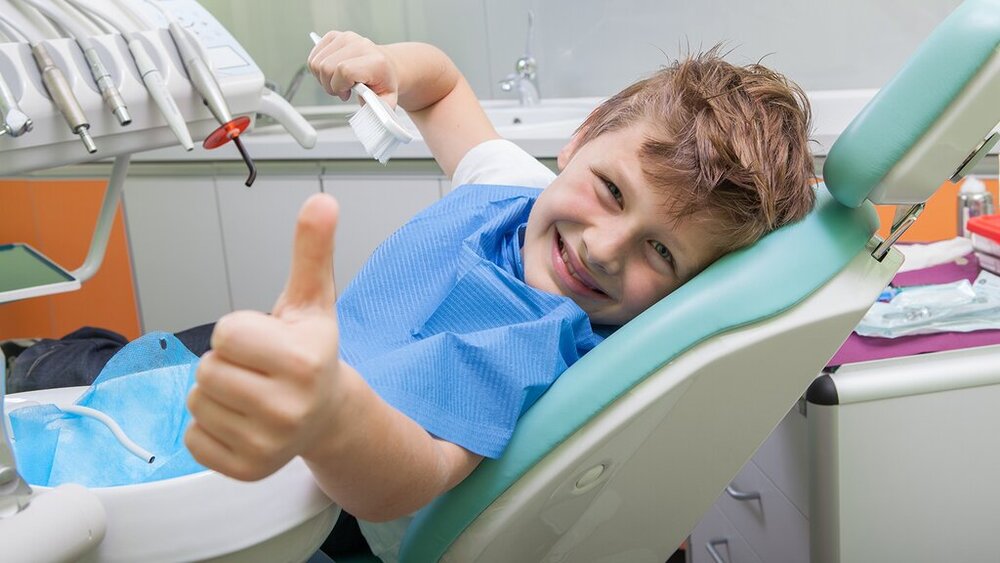
When Should I Consult a Dentist?
If you notice any signs of bruxism in your child, such as increased tooth sensitivity, jaw pain, morning headaches, or grinding sounds during sleep, it’s important to speak with your dentist or pediatrician. Additionally, if your child is experiencing disrupted sleep or showing signs of daytime sleepiness, seeking professional advice is crucial. Bruxism can often be managed effectively with timely intervention, helping to protect your child’s overall health and well-being.
At FineUp Clinic, we have been providing pediatric dental services for 20 years. Schedule an appointment with our specialists to ensure your child’s dental health is in the best hands!
